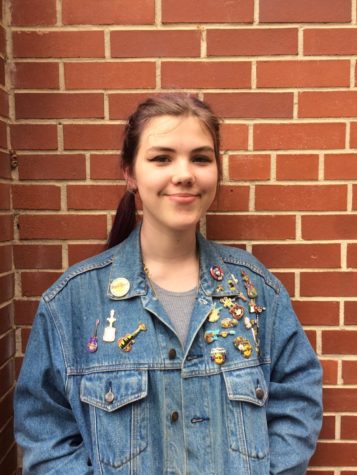Sarvesh Bandaru; a Soaring Eagle
Eagle, Sarvesh Bandaru excels musically, mastering a form of Hindustani classical vocal music.
Senior Sarvesh Bandaru, like most students, spends a lot of time studying notes. Not only the notes he takes in class though, musical notes as well!
Bandaru has an impressive academic record. Having skipped his junior year, Bandaru now takes a mix of IB and AP classes, plans to attend college courses at UNCC next semester, and holds first place in the senior class. Academically, he has a STEM focus; he’s taking IB Chemistry HL II and hopes to take Multivariable Calculus soon.
Bandaru however, is much more than just a model student: he’s also a performer. In fact, Bandaru is pursuing certification as a practitioner of Hindustani classical vocal music from Akhil Bharatiya Gandharva Mahavidyalaya Mandal, a prestigious music university in India.
“[The university] was actually founded by one of the greats of Hindustani classical music,” Bandaru said. “He’s well known for making it more popular. It’s a pretty old university, it’s well known; and I’m learning through that university, but I’m actually associated with a local organization called Aarohan Music. The teacher who runs that school is associated with the university, so I learn through her, and all of my examinations and things like that actually go through the university.” said Bandaru
After his next examination in November, Bandaru will receive his Visharad qualification, which is considered equivalent to a Bachelor of Music degree. Unlike a Bachelor’s, though, the Visharad takes at least seven years to acquire.
“Essentially, there are five years of basic training, where you learn the basics,” Bandaru said. “‘What is Hindustani classical vocal music?’ How to sing the notes, how to do the scales. In Hindustani music it’s called ragas, which are basically combinations of certain notes. So you essentially learn the basics of all of those through the first five years; you learn a variety of ragas [types of musical framework], and then you get into developing your voice so that it’s clearer, so that you can present it better; you can add some ornamentation to your voice instead of singing it plainly, and you slowly develop that.”
After the first five years, students are able to enter the more complex Visharad stage.
“The Visharad program is another two years where you really get into it, so now you start taking more advanced scales,” Bandaru said. “You learn more about the period, you’re expected to be able to perform everything on a certain level that’s higher, obviously, than you were in the first five years.”
The additional time and effort required for the Visharad program is not for everyone, though.
“It requires a lot of time, because especially in the Visharad program, lots of practice is required to make sure you understand what’s going on and you’re singing it well,” Bandaru said. “But at the same time, I definitely enjoy it, and I love just sitting there and singing, and getting into it. It’s just like any other art, right? Once you get into it, you’re in the flow.”
Bandaru’s love of music, and singing in particular, has been a constant throughout his life.
“My dad’s side of the family is very musical,” Bandaru said. “I think almost everybody in his family sings, whether or not they’ve had professional training. But they all love to sing, and that definitely did have an influence… We saw this program and, personally, I’m a much more structured person. So the format of the program, where it had a specific course where you could take the classes and learn the specific ragas and then take an exam at the end of the year to assess what you’ve learned, that structured coursework appealed to me, because I didn’t want to just learn random songs; I did want to progress from the basics onwards, and this program does do a good job doing that.” said Bandaru
Bandaru quickly discovered that he was talented at singing, and quickly advanced.
“When we found out about [the program], at the beginning it was more of a ‘Why don’t we give this a try?’ type of thing, because I had already started learning a little bit and we were like, okay, maybe this is a little more intensive… I caught on very quickly. I’ve been told that I have musical ears; I learned it very quickly and I was able to hit all the notes correctly, which is not that common for a first year student. So we thought ‘Why not continue?’ and as it went on, I started enjoying it more as the ragas got more complicated, and the scales, the nodes, what you have to do, just involves a lot more of your own thought process.” said Bandaru
Though he may have a mind for STEM, music and the arts serve as an anchor for Bandaru, and being well-rounded has had a positive impact on Bandaru’s day-to-day life.
“I personally think I am a very logically minded person,” Bandaru said. “Very straightforward, and that’s why math and science appeal to me. I do like how it’s very structured, especially chemistry and biology. But the singing has given me a new perspective, because I’ve learned that it’s not all about that… And no matter how school is going, or what I’m doing in school, I can always rely on coming back home and singing, and it’s just something that has made me more well rounded and more appreciative of everything that goes on around us.” said Bandaru
But Bandaru says the most valuable lesson singing has taught him is the value of authenticity.
“Singing has really just taught me to just be myself,” Bandaru said, “to just put myself out there, the way I am. Singing really requires you to just open up, and you can’t do well in singing if you’re not yourself… I’ve learned that there’s nothing wrong with who I am, and if you just be your most genuine self, that’ll make everything work out.”
Your donation will support the student journalists of East Mecklenburg High School. Your contribution will allow us to purchase equipment and cover our annual website hosting costs.








